For the class of 2020, the graduation was totally different. Because of the COVID-19 outbreak, many Chinese universities moved their ceremonies online and celebrated the occasion via live-stream. Peking University held its virtual graduation ceremony on July 2 and invited Zhong Nanshan, an academician at the Chinese Academy of Engineering and a heroic figure in China’s fight against the pandemic, to give the commencement address. “You shall grow with enthusiasm and passion, and embrace a brighter future with your power as young people,” declared the pulmonologist in his online speech. The university also made in-person arrangements for those still on campus. Except for small receptions at school gates, the normally boisterous graduation atmosphere outside the Peking University Hall was quiet and orderly. The school gifted graduates “health bags” filled with epidemic prevention materials.
Graduating Online
Driven by COVID-19, students who were preparing to graduate this summer had to move everything online: classes, interviews, thesis presentations, and farewells.
“When the first group of 2020 graduates returned to campus, many of them cried,” said Hao Ping, president of Peking University. “But I saw hope and determination in their eyes. We are in a fluid world, and while some changes are predictable, others, like the pandemic, come as a shock. The COVID-19 pandemic has been profoundly challenging not only individuals, but families, schools and society.”
Many graduates did not return to campus to attend graduation ceremony in person. In Kuala Lumpur, Malaysia, 12 international students enrolled at Peking University borrowed graduation gowns from friends and watched the live-stream occasion together. The virtual ceremony was the finale to their studies in China. Deng Shixuan, a Masters graduate of International Studies, said his entire graduation process was online. Peking University made digital diplomas and encrypted degree certificates. Students who graduated “digitally” were offered the option of attending the graduation ceremony next year to receive paper documents.
The School of International Studies at Peking University organized teachers and faculty to pack up the dorm rooms of students who could not return. They coordinated with students to determine what to send back and worked with SF Express to ship their luggage. The school even reimbursed students to partially subsidize delivery fees.
Deng Shixuan was deeply touched to receive five boxes of luggage from the school, signaling the end of his studies in China. Although the teachers threw in graduation souvenirs and packed his stuff perfectly, Deng still felt remorseful that he wasn’t able to do the packing. He thought it would be a part of graduation, a time to reflect on the past, and a sort of starting point for his future.
Unlike Deng, Hao Nan, a Chinese student studying in Lee Kuan Yew School of Public Policy at the National University of Singapore, was able to pack himself. Hao Nan even took some pictures as souvenirs before returning to China. “The school postponed the ceremony until next January,” said Hao. “I got my diploma online, and we said goodbye to each other in a virtual meeting for graduates.” Everything felt rushed to him. No ceremonies, no hugs, no goodbyes, and he just left.
You Made It
“We were planning to return to campus in early June in small groups,” said Wang Weijia, a 2020 graduate of People’s Public Security University of China (PPSUC). “But suddenly Beijing caught a new wave of coronavirus, so only the first group got to go back.” After finishing his graduation thesis at home and giving his presentation online, Wang felt like the summer was a waste.
Cao Sihan, an undergraduate of the School of Sciences at Nanjing University, also stayed home to prepare her thesis. Students of science and engineering have a harder time writing papers at home than those studying social sciences and humanities. “It felt impossible because we could not use labs. No labs, no experiment data, and no papers.” Without necessary data, she had to change the subject of her thesis. “Shifting to a new subject is hard. It was just devastating.”
The challenges posed by COVID-19 to the graduates were unprecedented. They had to brace for many uncertainties: long-distance discussions about papers with tutors, video presentations, online job-seeking, and postponed postgraduate entrance reexaminations. Cao Sihan felt anxious for most of the summer and kept telling herself that every college senior was facing the same situation. She found solace when she finished thesis presentation, graduated successfully, and got accepted to a postgraduate program.
While Cao is seeking another degree, Wang Wenjia plans on starting a professional career. Like many graduates of the PPSUC, Wang wanted to be a police officer. So, after preparing graduation paper and presentation, Wang also had to study for the civil service examination.
“Because of COVID-19, the tenure of our internships was cut short and the civil service examination was postponed,” Wang said. “But I am not discouraged. I have become even more determined to become a policeman.” Wang regretted he wasn’t yet able to join frontline work to control the pandemic, especially upon seeing colleagues’ devotion.
A highlight of PPSUC’s commencement ceremony is when students take an oath in unison. This year, Wang and his peers still solemnly took the oath in a virtual ceremony. But he had always wanted to witness the moment in person with his classmates. “I was only able to say farewell to faces on screens, and that is probably what I will remember.”
Only Making Us Stronger
As graduates make an exodus from campus, the students just taking the college entrance examination are poised to replace them.
On March 31, the Ministry of Education announced that the national college entrance examination, which normally takes place in June, would be postponed a month. It was the first time the test was delayed since the SARS outbreak in 2003. For many students preparing for the major exam, the news eased their anxieties about online schooling and provided much-needed extra time to study.
“I was a little relieved to hear that news, because it bought me more time to prepare for the exam,” said Wu Xiaoyu, a student of Nantong High School in Jiangsu Province.
Wu Xiaoyu noted that virtual classes are different from real ones because of the disconnect. They require students to develop better self-discipline to concentrate. “Our teachers require us to keep our laptop cameras on during class to make sure we are listening. They repeatedly stress that there is no time to relax and that every second matters.”
High school students were not running the prolonged marathon alone. Their teachers and parents looked after the students’ mental and physical health. As a parent and teacher, Wu Jian, father of Wu Xiaoyu, was just as busy as his daughter.
“As a parent, I had to download study materials for her, submit her homework, report on her health to the WeChat group of parents, and keep my eyes on her mental state,” said the senior Wu. “As a teacher, I had to arrange my daily teaching schedule, design homework for students, help students with unsolved questions, and maintain communications with students and their parents.”
The nationwide exam during such a strange time attracted nationwide attention. Alongside COVID-19, flooding in some areas presented further problems. Days of torrential rain drenched a wide area at the middle and lower reaches of the Yangtze River, which made it even harder for students in those places to safely and timely reach exam sites. Wu Xiaoyu reported that after rain continued for three days before the examination, security measures were significantly enhanced. Police officers, medical workers, and even soldiers were dispatched to make sure every student could attend the exam safely.
Many have joked that the class of 2020 high school graduates is “the saddest group,” because they were born in the year of SARS outbreak and had to take the college entrance examination in the year of coronavirus. Wu Xiaoyu disagrees. “Some say ‘this sucks,’ but I say ‘this happens.’ As the COVID-19 class, we have endured a lot and survived. The experience was unique.” The memory of 2020 taught them that those who survive ultimately thrive.
Wang Meng, a candidate from Xixian County, Anhui Province, had a unique experience. On July 7, many roads in her county flooded, and parts of the exam were postponed. The authorities rescheduled the exam for the next day and sent armed police to escort students to exam sites. When Wang Meng arrived in a bus arranged for students, she noticed that the police were waiting to pick them up. They were waiting in two rows, umbrellas in hand, to create a dry passage from the bus to the exam building. “I was moved to tears,” Wang said. She treasures the experience. “It was such a once-in-a-lifetime experience. Perhaps it was a gift of fate.”
The class of 2020 may not have enjoyed a perfect graduation season, but they overcame major obstacles and matured steeply. Perhaps the profound life lessons were the best graduation gift. With memories of this summer in tow, graduates of 2020 will soon embark on new journeys and brave other winds and waves.
Unsettling End for Class of 2020
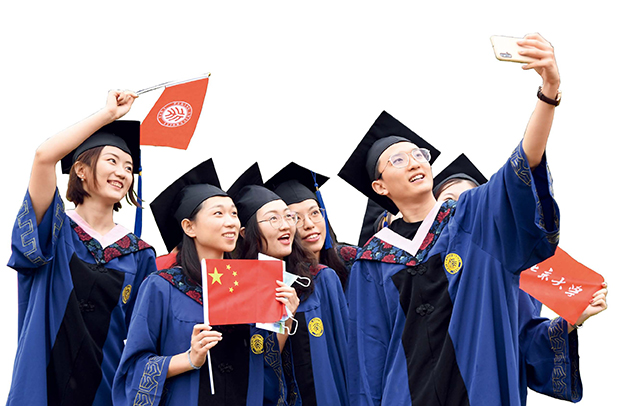
Graduates of Peking University take pictures after the ceremony on July 2, 2020. (REN CHAO)
The challenges posed by COVID-19 to the graduates were unprecedented. They had to brace for many uncertainties: long-distance discussions about papers with tutors, video presentations, online job-seeking, and postponed postgraduate entrance reexaminations.
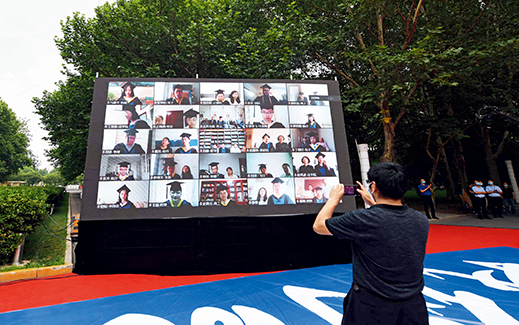
Graduates of Beihang University attend a livestreamed commencement ceremony from home on June 29, 2020. Live videos are displayed on a big screen at the ceremony.
(HE GUANXIN)
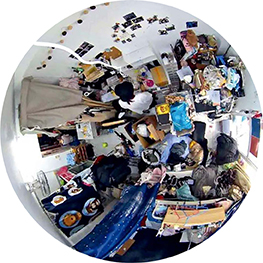
Teachers from the Communications University of China remotely coordinate with students who could not return to help pack up their dorm rooms. (ZHANG JINGJIE)
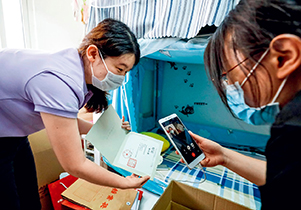
On July 15, 2020, Wei Fachao, an instructor at the School of Business of Renmin University of China, livestreams her packing work for graduates who cannot return. The university organized staff to pack up and send luggage to nearly 8,000 graduates.
(SHEN BOHAN)
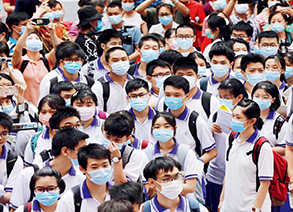
Students enter the exam site at Guangzhou No. 16 Middle School on July 8, 2020, Day 2 of the National College Entrance Examination.
(LI ZHANJUN)

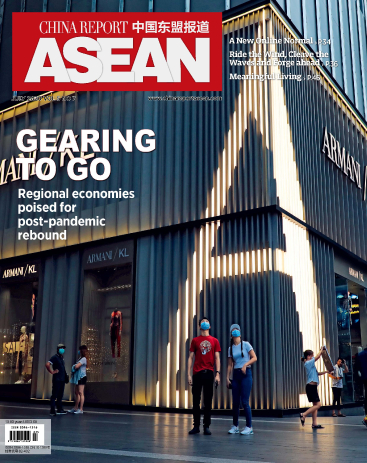
 Copy Reference
Copy Reference